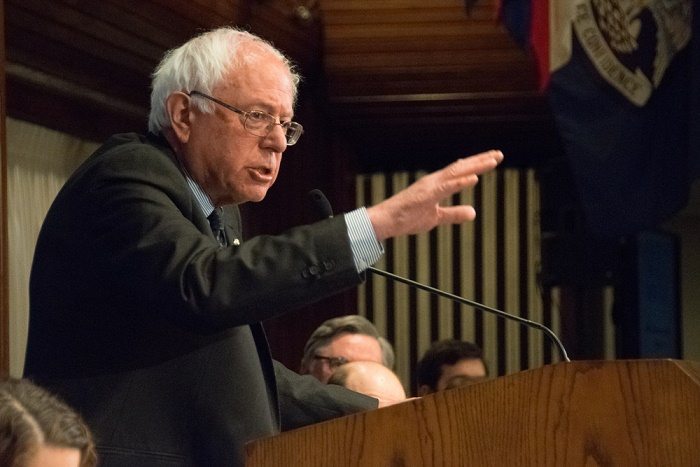Bernie Sanders to Media: Talk About Inequality, Not Campaign ‘Soap Operas’
"This is not the Red Sox versus the Yankees," Sanders said. "I ask the media’s help on this—allow us to discuss the important issues facing the American people."

Sen. Bernie Sanders (I-VT), who announced Wednesday that he will run for president, asked members of the media on Thursday to help make the 2016 campaign about real issues like inequality instead of turning campaigns into “soap operas.”
“This is not the Red Sox versus the Yankees,” Sanders said. “I ask the media’s help on this—allow us to discuss the important issues facing the American people, and let’s not get hung up on political gossip or all the other soap opera aspects of modern campaigns.”
Sanders kicked off his speech with a discussion of inequality, one of his key issues along with climate change and campaign finance reform. He said America “has more serious crises than at any time since the Great Depression of the 1930s.”
Sanders said the top 1 percent owns almost as much wealth as the bottom 90 percent (actually, the top 0.1 percent does), and that Americans are working “longer hours for lower wages” despite rising productivity.
“That type of economics is not only immoral, it’s not only wrong, it is unsustainable,” Sanders said.
He touted his $1 trillion infrastructure bill as a way to create the millions of new jobs that he says are needed. That bill, the Rebuild America Act, was the only concrete policy proposal he mentioned in the speech other than his support for free tuition at public colleges and universities.
Sanders said that if people who are underemployed or have given up looking for work were counted, the “real” unemployment rate would be closer to 11 percent than 5.5 percent.
Some policy analysts say that stagnating wages and low labor force participation are especially devastating for women and for communities of color, who also suffer higher unemployment than the general population.
Sanders, who identifies as a democratic socialist, insisted that he is “in this race to win” despite media narratives that he’s only running to push Hillary Clinton to the left on a number of issues.
Sanders acknowledged that it would be a tough win. He said he hesitated to run partly because he knew he wouldn’t get many donations from the “billionaire class” that is increasingly necessary to fund a winning campaign—a “sad state of affairs” in American politics, he said, especially after the “disastrous” Supreme Court decision on Citizens United.
Sanders managed to strike an optimistic note on his campaign’s outlook. “If you raise the issues that are on the hearts and minds of the American people, if you try to put together a movement … that’s not ‘raising an issue,’ that is winning elections.”

